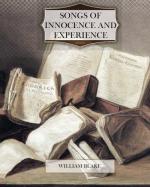|
This section contains 7,201 words (approx. 25 pages at 300 words per page) |

|
SOURCE: Linkin, Harriet Kramer. “The Language of Speakers in Songs of Innocence and of Experience.” Romanticism Past and Present 10, no. 2 (summer 1986): 5-24.
In the following essay, Linkin analyzes the speech patterns of the narrators of the individual poems in Songs.
Like the eighteenth-century grammarians who view discourse as a template of the human mind, Blake correlates syntactic structures with patterns of thinking.1 In Songs of Innocence and of Experience, individual patterns of speech—or idiolects—reveal how characters organize their thoughts.2 The many conjunctions marking the innocent chimney sweeper's speech or the inverted logic of the experienced sweeper's statements constitute linguistic habits that demonstrate cognitive differences: grammar reflects the perceptual limitations of speakers locked in partial views of reality. Even as he establishes these linguistic patterns for the voices in the lyrics, Blake disrupts them to prevent our easy acceptance of his characters' stated beliefs: verbal discrepancies produce...
|
This section contains 7,201 words (approx. 25 pages at 300 words per page) |

|


